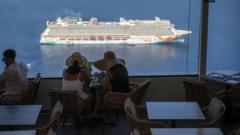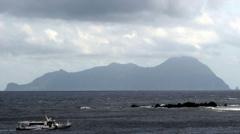As Santorini braces for a potentially difficult summer tourist season following a series of earthquakes, hotel owners and workers express their worries over declining bookings and job security. The government has acknowledged the situation, but calls for improved infrastructure and support remain crucial for the island's future.
Santorini's Tourist Economy in Crisis Amid Ongoing Earthquakes

Santorini's Tourist Economy in Crisis Amid Ongoing Earthquakes
The Greek island of Santorini faces significant challenges in its upcoming tourist season due to thousands of earthquakes, leading to declining bookings and staffing concerns.
As Santorini gears up for the unofficial start of the tourist season, which typically begins in February when cruise ships arrive and the Easter holidays approach, the island is grappling with significant uncertainty due to ongoing earthquakes. Since January, thousands of tremors have shaken the popular tourist destination, leading to fears that its vital tourism industry could suffer dramatically this year.
Antonis Pagonis, president of Greece's Association of Hoteliers, noted a recent drop in bookings, expressing hope that this situation would be temporary. However, he outlined the broader challenge hotels face: a potential shortage of seasonal workers to accommodate the influx of tourists. Santorini, home to a permanent population of approximately 15,000, relies heavily on seasonal employees from other regions who help manage the tens of thousands of tourists that visit daily during peak season.
The island's workers are already feeling the impact of the seismic activity. Manos, a bartender who has worked in Santorini for several summers, shared his fears about job security this season. "I'm worried there won't be enough tourists. If the season is weak, I might not make as much money," he explained. As a result, he has secured work in Corfu instead.
In addition to seasonal hospitality staff, construction workers are necessary during this time to prepare hotels for visitors. However, safety concerns stemming from the earthquakes have stalled these efforts. As a solution, hotel owners have urged the government to support employees by subsidizing a portion of their salaries until construction can resume.
Greek authorities have responded promptly to the seismic risks by deploying rescue teams to the island and declaring a state of emergency to facilitate the provision of aid. However, industry insiders, like hoteliers, are advocating for long-standing infrastructure improvements, including the construction of a new port to accommodate the high volume of visitors.
Currently, Santorini's tourism sector contributes significantly to Greece's economy, accounting for approximately 2.5% of the national GDP and generating around €5.9 billion annually. Despite reports of declining bookings, cancellations have yet to materialize. Still, hotel operators worry that if the situation persists for another month, the repercussions could be dire for local businesses.
During a visit to the island, Prime Minister Kyriakos Mitsotakis emphasized the importance of preserving Santorini's reputation as a top tourist destination. He acknowledged the need to protect the island's image and ensure a prosperous future for tourism in the years ahead.
Hotelier Margarita Karamolegkou, who employs 120 staff across her four hotels, expressed concern about the potential need to delay their openings amidst ongoing tremors. "We have been in this business for decades, operating at the highest level. I am confident that even with fewer staff, our services will remain exceptional," she said, showcasing the resilience of Santorini's tourism industry amid uncertainty.






















